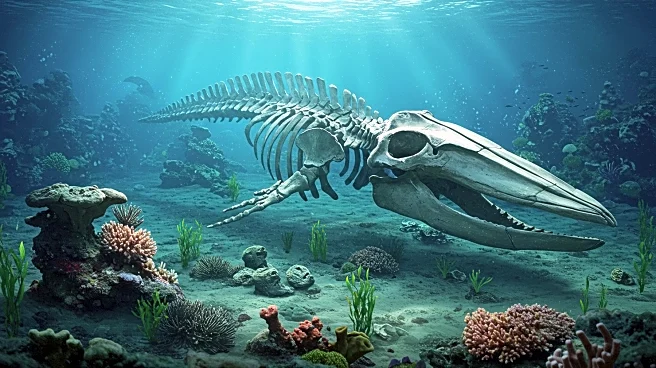What is the story about?
What's Happening?
A team of paleontologists has identified a new prehistoric whale species, Janjucetus dullardi, on a beach in Australia. The discovery was made by Erich Fitzgerald, a senior paleontologist at Museums Victoria Research Institute, and his team. The species, which lived approximately 25 million years ago, is described as having features reminiscent of a whale, a seal, and a Pokémon. It measured less than ten feet in length and had distinctive characteristics such as large eyes, sharp teeth, and a pointed snout. The first specimen was discovered in 2019 by Ross Dullard, an amateur fossil hunter and school principal, after whom the species is named. Dullard plans to celebrate the naming with a fossil party, marking the culmination of six years of dedication to the discovery.
Why It's Important?
The discovery of Janjucetus dullardi provides significant insights into the evolutionary history of whales, offering a glimpse into the diversity of marine life millions of years ago. This finding contributes to the understanding of how modern whales evolved from their prehistoric ancestors, highlighting the adaptations that have occurred over time. The research underscores the importance of paleontology in uncovering the mysteries of Earth's past and the role of amateur fossil hunters in scientific discoveries. The naming of the species after Ross Dullard also emphasizes the collaborative nature of scientific research and the contributions of non-professionals to the field.
What's Next?
The discovery may lead to further research into the evolutionary pathways of marine mammals, potentially uncovering more about the ecological roles these ancient species played. Scientists might explore additional sites in Australia and elsewhere to find more specimens, which could provide further evidence of the species' characteristics and behaviors. The fossil party hosted by Ross Dullard could also inspire more amateur fossil hunters to engage with paleontology, potentially leading to new discoveries.
Beyond the Headlines
The naming of Janjucetus dullardi highlights the cultural impact of scientific discoveries, as the comparison to Pokémon reflects the intersection of popular culture and scientific research. This could influence public interest in paleontology, making the field more accessible and engaging to a broader audience. Additionally, the discovery raises questions about the ethical considerations of naming species and the recognition of contributions from amateur scientists.















